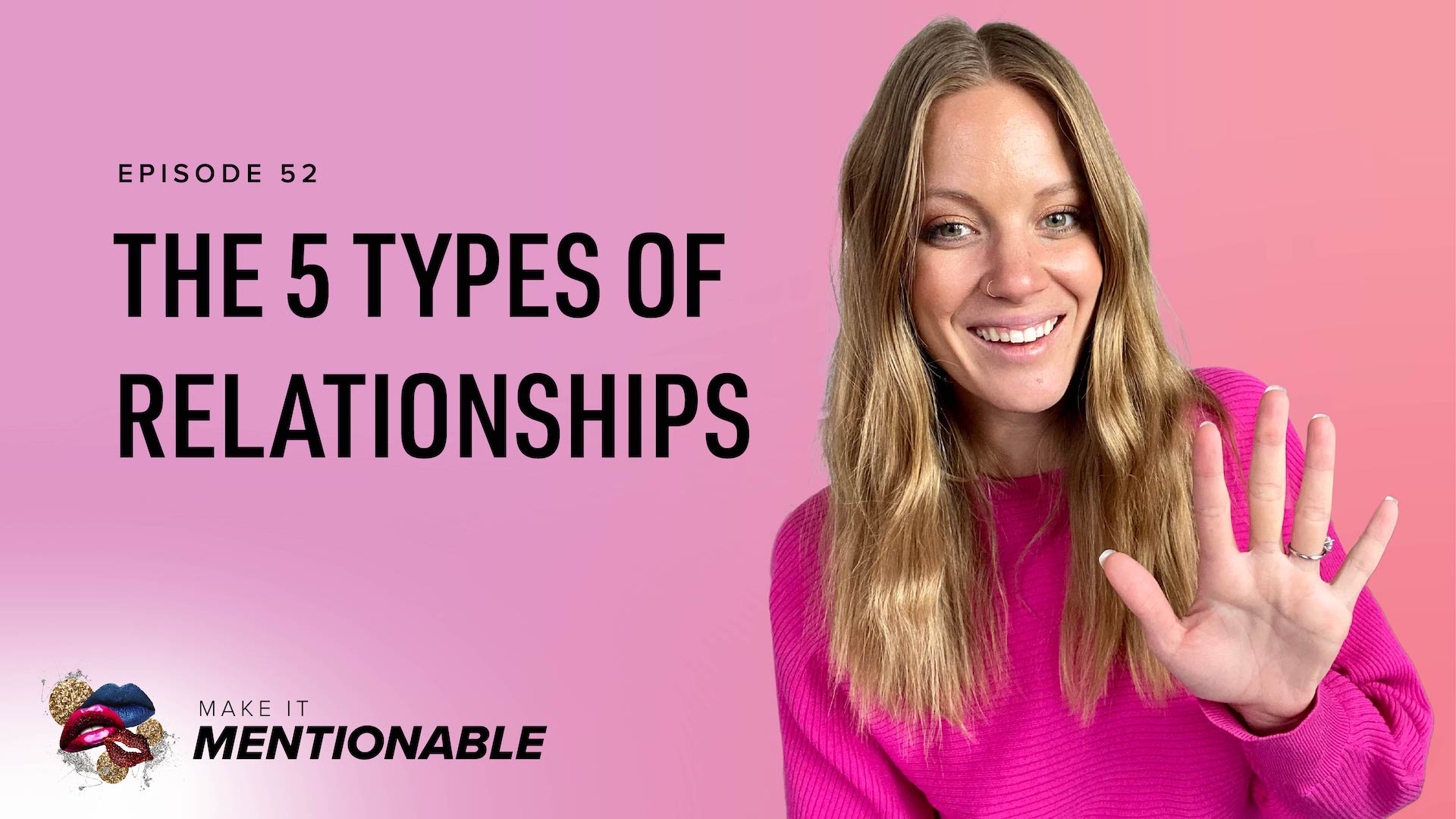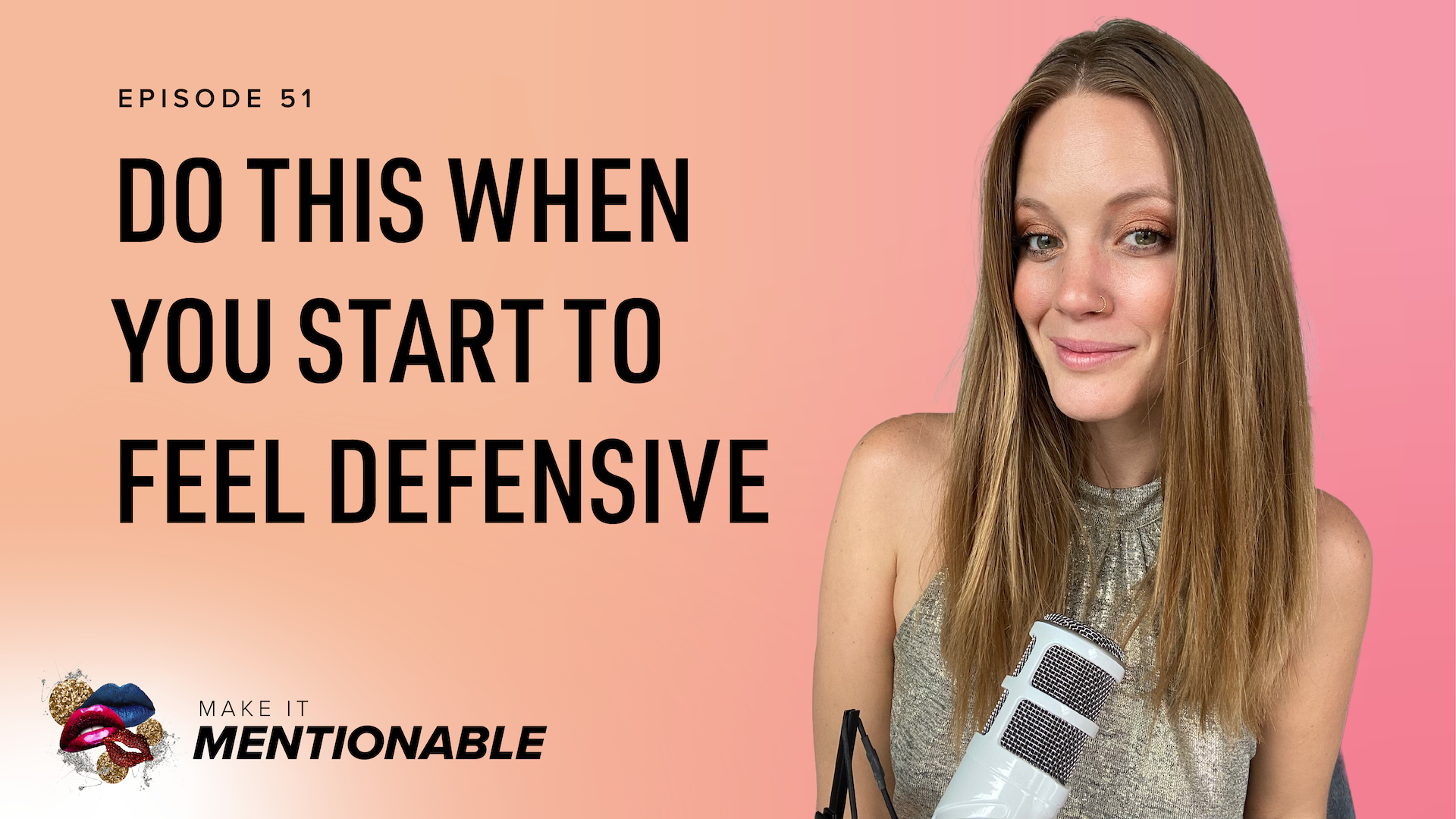Alyssa Patmos 0:04
This is Make It Mentionable. I’m Alyssa Patmos and this is the show about being human in a world that encourages us to be robots.
I invite you to join me as we journey through the mess, the magic and the mania in between.
Because what we can talk about, we can manage.
This honest conversation extravaganza includes free flowing conversations and high doses of vulnerability to remind you that you aren’t alone. No topic is off limits, and episodes are designed to leave you smarter, aka more self aware than when you came.
I am so glad you’re here.
Hey there! And welcome back to another episode of Make It Mentionable.
This is our 45th episode. I’m like, I can’t believe we’re already at 45.
And this week, I have a perspective pivot for you to consider.
I love talking about perspective, because sometimes it’s these small shifts in our perception that like radically shake up something in our world.
And it doesn’t require this like huge life overhaul. perspective, pivots can hold so much power.
This Week’s Perspective Pivot Is About The Self-Help Industry
And this week’s relates to the concept of self help. Did you know that the self help industry is expected to grow to 14 billion by 2025. So obviously, there is money all encompassed around this notion of feeling like we need to help ourselves, and like we need to fix ourselves.
And I love the notion behind improvement, and development. But there’s a big difference in the words that we use words matter. Because language, like so many other things in life, is patterns.
And the way that we’ve used words up to a certain point influences how we feel about them, and it shapes the collective pattern as well. And so when we, when we hear a word like help, it brings out certain feelings, it elicits a certain context.
And, and is it really the most helpful word for what the self help industry is trying to achieve?
Shifting From ‘Self-Help’ To ‘Self-Growth’
That’s the perspective pivot this week. So I’m want you to consider shifting your perspective from self help to self growth.
And here, why. So our perception influences our attitudes, our actions, and therefore ultimately, what ends up happening.
And so naturally, our perception to development is, is going to influence our attitude and our actions around and what ends up sticking.
And I’m in how I’m obsessed with helping people embrace change, because the only thing certain is uncertainty.
Making Change Feel Easy
And we’re not taught how to how to roll with the amount of change that we face on a daily basis. And when change feels negative, and rooted in criticism, and judgment, and, and shame, we avoid it or we resist it.
But when change brings about feelings of positivity, or hope or optimism or joy, we embrace it.
How Self-Help Is Like A Public Restroom
So this perspective, pivot, shifting from self help to self growth can help us embrace change rather than like feeling it’s like the equivalent of a public restroom.
You know, if you think about a public restroom, especially if you’re a woman, you don’t really want to use it, like you know, you have to go so you’re gonna use it, but then maybe you like end up squatting because you’re trying to adapt around the fact that like, you don’t really want to be in here in the first place.
So it’s not optimal. It’s just not it’s not it’s just not optimal.
And self help can feel like that. Beyond like, the public, the public restroom, like you know, there’s something that you want to do or that you have to do, but you don’t really want to use it and that’s why we end up with like book upon books have on our shelf with exercises that like have never been done.
And but there’s a different perspective. And that perspective is around personal growth.
Reduce Burnout By Thinking About Self-Improvement Like This
Self Help, in general brings about notions of fixing flaws. And it feels very reactionary, and outcome focused. And then all of a sudden, it’s like we have a laundry list of things to fix about ourselves.
And a lot of times, that’s how, that’s how it can feel. It’s like, oh, I have to fix x, and then I’ll fix y and then I can do Z. Forget ever trying to do Z before I fix x, and y.
And that can lead to burnout, self help, burnout is real. And this is what my meltdown was around last week. So since December, I’ve been going to Neurofeedback sessions, I’ve been to 55, which is a lot of time, weekly.
And I was starting to get exhausted by it. And up until about two weeks ago, I’d been fine going like it was it was taxing and I would complain sometimes about the amount of energy but I was generally fine with going the past two weeks, I noticed like Oh, I really don’t want to go and I was throwing up all sorts of resistance to going like, one day comically my car battery even died before I was headed to a Neurofeedback session.
And as I sat down with it, what I started to realize is the mental track record had shifted at one point, and instead of feeling like, I’m doing this for growth, and for my development, it started to feel like I was doing it to fix something.
And like I had to help myself in that way. And the mental track when I think of Neurofeedback in that regard sounds like I would really like OCD to be a thing that I didn’t have to manage.
Why do I have to go to these sessions when other people don’t? And when is it going to work? When is it going to be over.
And it puts all of this pressure on it to be this this thing that is that is going to be solved. And the reality is I have no idea what the exact outcome will be.
Letting Go Of The Outcome And Focusing On Growth
And so as I sat with us and I sat with the resistance to going, I realized, like, oh, like I’m feeling burnt out, because it’s starting to turn into a laundry list of ways that I’m fixing myself. And then that spiraled into looking at other things I’m doing right now.
And like, oh, do these feel like I’m fixing myself too.
And that can get exhausting, it can get so exhausting to feel like you’re trying across the board to make things different.
And it puts pressure that there’s like a timeframe to it.
What I Tell Myself When I Feel Discouraged About My Progress
When I think about neurofeedback in the sense of personal growth or personal development, the thought track is different.
And it sounds like I want to support my brain’s highest functioning. I want to support my mind and engage in healthy behaviors. I choose to support how my brain functions. And in that sense, it’s it allows for the evolution.
And it’s saying I’m the type of person who makes healthy decisions for my brain. And so I’m gonna go do this thing.
And it’s not just about fixing something that might be tied to the root of, of OCD, or it’s not just about fixing it so that it gets even easier to manage.
People can have this in terms of money as well, like, a huge portion of the self help industry involves people’s relationship to money. And so when we think about it in, in the sense of self help, it can the fix it mentality, it can sound like, oh my gosh, I have to get out of debt. I can’t believe I don’t have a better plan for my money. I was so dumb with money, and I have to change.
The self help is there. It’s this like this, like it can be rooted so much the tracks that come up when people are thinking about it in that way can be rooted so much and criticism and judgment or shame, rather than thinking of ourselves as a work in progress, or something to be fixed.
And every single time I fall into the trap of needing to fix myself instead of accepting myself I take 10 steps backwards, instead of 10 steps forwards.
Here’s What It Sounds Like For Me To Talk About Self-Help Without The Inherent Judgement or Shame
So the personal growth track around money or the personal development, if one of those words jumps out to more is I want to be a Money Maven.
I want to understand the pragmatics and the energetics of money so well, that it feels natural gets me all the time, I’m willing to learn new habits to feel like a money Maven.
The Power Of Allowing And Accepting
Or there’s weight, because weight is a huge area of the self help self growth industry as well. And in in a lot of ways, it’s more advantageous, especially in terms of like larger scale marketing for us to feel like there’s something to fix about ourselves.
But there’s not, the trick is allowing and accepting.
And this has never been more true for me in terms of, of weight. So sometime in the past four years, I lost 30 pounds. And that’s not a trivial amount. I don’t talk about it often, because I’m not a weight loss coach.
It’s not something that I focus on all the time. But it does perfectly relate to what we’re talking about today in this shift from self help to self growth. And I say I lost 30 pounds sometime in the in the past four years, because I wasn’t exactly trying for that to happen. And, and there’s not one thing that I did, it wasn’t like this goal, I’m gonna lose 30 pounds, I’m gonna shed this weight.
And, and the track record when I was in college, like, there were times in college, when I when I wasn’t happy with with how I looked, or I wanted it to be better. And it was like, Oh, this dress doesn’t fit, I’m gonna go to the gym, or I can’t fit into this size. Like, I’m gonna go to the gym.
And it felt like this, like punishment cycle, it was very much like, I’m noticing something about myself that I don’t like. So now I’m going to engage in this behavior that’s going to help fix it. In the past four years, when the 30 pounds has melted off, I wasn’t saying that I wasn’t doing I wasn’t operating in that cycle.
Why I Tell Myself Daily ‘My Body Is An Excellent Communicator’
Instead, I started saying, I want to support my body to function optimally. I am the type of person who is incredibly healthy.
I want my digestion to be magical. I’m the type of person who invests in my health, because I only have one body. And as a result, I ended up learning about Paleo and keto lifestyles.
And notice how I say lifestyles, not diets, diet culture can very much go to like the self help world of like, you have to fix this about yourself. Whereas like, how did I want to change my lifestyle? What did I want to focus on? And how did I want to support myself? And so I started adjusting my cooking to some of their principles. And over time, it got way easier to just, I live that lifestyle. And I made them work for me.
And I started saying, I’ve talked about this before, but my favorite phrase that I’ve adopted, I started saying my body is an excellent communicator.
And I started listening to what it had to say.
And at this point, my body will tell me, okay, it’s okay to eat this, it’s better not eat this right now. And I is way I’m better able to interpret my body signals now than I ever was before. And I’ve gotten healthier day by day as a result. And that type of change feels freeing because from this place, when it comes to making a switch for for optimal health.
It’s not from this place of judgment. It’s like no, I’m doing this because like I want I want even more health and, and it becomes easier to make those small changes. Like I recently experimented with cutting out certain types of meat and incorporating others or I wasn’t eating a bunch of fruit for a long time, then I experimented with eating fruit to see like what my body had to say about it, how it felt what what changed, and embracing those changes didn’t feel like punishment or, or like I was depriving myself because I knew the intention behind it.
And it was rooted in more health, being able to better hear and interpret my body’s signals.
Your Challenge: Love Yourself Enough To Grow
So on most days, I love myself enough to grow.
And on days I don’t I practice remembering we’re all works in progress. And that’s kind of the point.
When We Stop Evolving, We Die
When we stop evolving. We die. And this is why I love having flowers in my house. It’s why I love having plants in my house. Talked about Olivia the orchid before she is blooming again right now.
But a few weeks ago she had absolutely no flowers on her. And so just this reminder of seeing the growth process and seeing things unfold. The fruit isn’t there right away. And and Olivia is judging herself when she has no more flowers on her at the moment. Plants, plants don’t do that. They just are you And yet, we don’t always afford ourselves that same grace and that same natural process.
Treat Yourself Like Your Favorite Plant (Don’t Expect Flowers Year-Round)
So the results, when we shift our perspective from self help to self growth are drastically different because the attitude, the intention, and the perception of what we’re engaging in, is different.
If I continue to go to neurofeedback, and I’m stuck in like self help burnout feel like it’s I it has to work and I have to fix it, the results are not as good because I’m more stressed, even when I’m going when I can allow it to be an unfolding process and say, Okay, I’m choosing this to support my brain, I’m choosing us to support my nervous system, it, it relaxes my system, and the results stick there a better.
This is true in coaching. It’s true in weight, it’s it’s true, any area where we’re trying to improve ourselves, the or develop or evolve or grow the attitude and intention that we go into it with matters for how, for what action we end up taking, and for how that leads to results that that stick around.
Pulling Up The Roots of Judgment And Criticism And Embracing Change Instead
When we think of self help, and that fix it laundry list, it’s change, rooted in criticism, or in judgment or about noticing a flaw and wanting to fix it. The other around growth is changed, embraced because the choice feels good to us. And because we know our works in progress, deep down, I truly believe that each one of us, like we crave to allow more of ourselves.
And over the years, we’ve adopted strategies of criticism and judgment, or perfectionism or any number of coping strategies to to be able to function, but those aren’t always helpful.
And, and we crave to allow more of ourselves to come out to allow those pieces of us that we’ve shoved away to to come out. Self Help can be very reactionary, and outcome driven. Personal development or growth, on the other hand, is rooted in evolution. And the words alone, I think help give us a more compassionate perspective to what’s going on.
And the perspective totally matters when you engage in change. The problem with help to is it can also didn’t put the authority outside of ourselves. Like yes, we’re helping ourselves but like also, who’s guiding me along that that path and like they help themselves. So do they have all the answers. And I don’t like that I like returning, returning our power back to ourselves more and personal growth reinforces that message for me as well. When we create a laundry list of things to fix about ourselves, we move further and further away from allowance and acceptance.
And it feels like this approach of like not being good enough until we’re the best version of ourselves. And that’s an impossible goal. There’s always more that we can develop. And again, like that’s the point of life to evolve and develop means to expand or enlarge and to aid in the growth of it’s not about fixing. It’s not about fixing this laundry list of flaws. It’s about strengthening and evolving. Growth means to increase in size by a natural process. That sounds way better to me. How does it sound to you?
Allow Yourself to Expand And Evolve
When we shake up our intention from self help to self growth, our energy shifts from needing something to be fixed to allowing something to expand and evolve.
And this subtle perspective pivot makes a world of difference in the change we decide to embrace and in the way results stick because one comes from a place of criticism and judgment most of the time, and the other comes from a place of allowance, acceptance and encouragement of evolution.
I would absolutely love to know your thoughts. Which phrase resonates with you the most but at this conversation spark for you. And come continue the conversation with me over at Alyssa patmos.com forward slash show. This is episode 45.
And if you want more fresh perspectives in between episodes, sign up for my newsletter, the Peel, at AlyssaPatmos.com. If you catch yourself contemplating the difference between self help up and self growth and find that it opened something up for you this week. I would absolutely love to know head on over to the comments. Thank you so, so much for tuning in and I will catch you next week.
You’ve just finished listening to another episode of Make It Mentionable with me your host Alyssa Patmos.
If you’re looking for more in between episodes, then sign up for The Peel. It’s my free newsletter that gives tips for how to navigate whatever life dishes and it’s also the place where I share the juiciest of the stories. To check it out, head on over to AlyssaPatmos.com/ThePeel. Thank you so much for tuning in. And I’ll see you next time.
Transcribed by https://otter.ai











